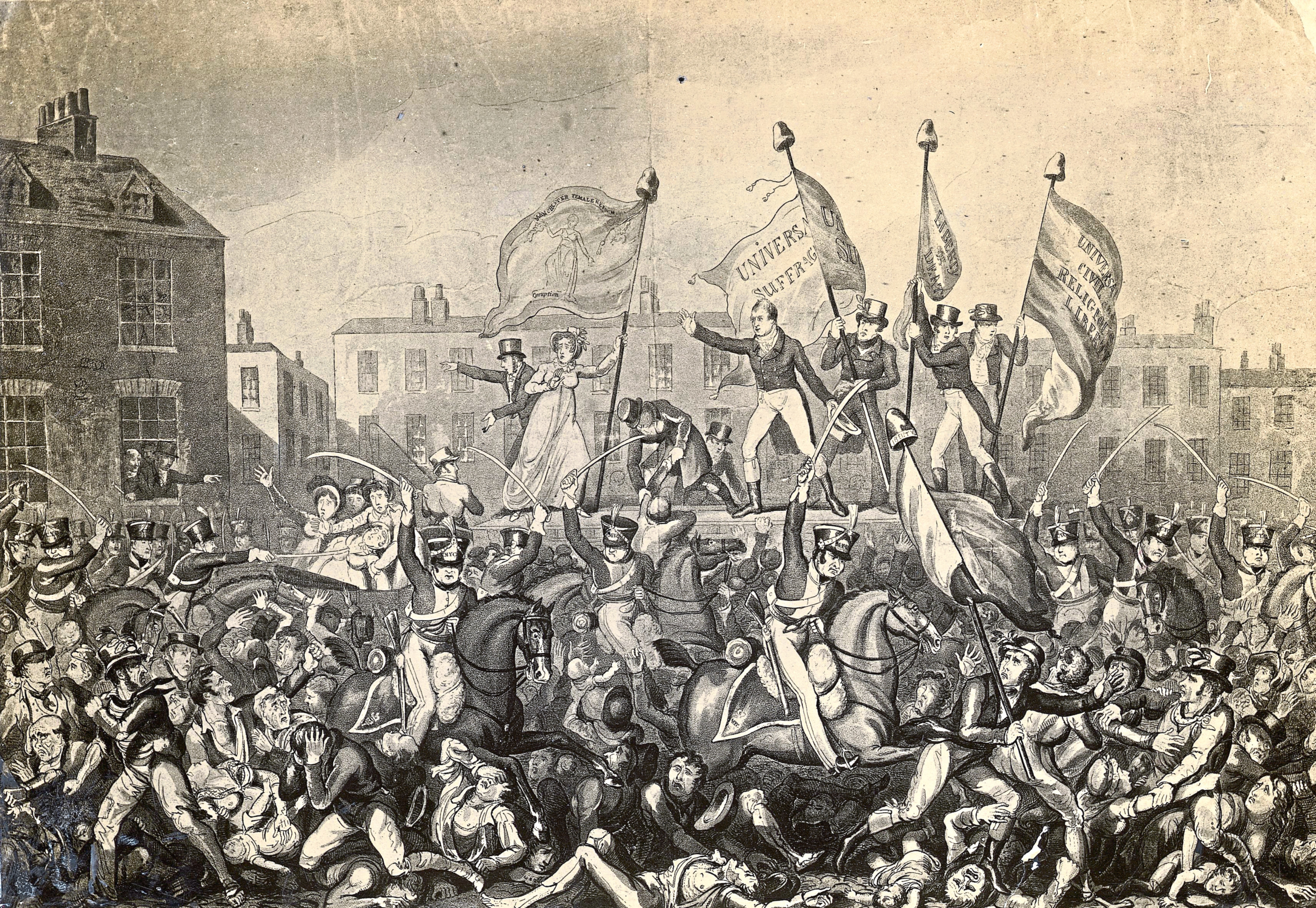
ONE of England’s darkest days will shock a new generation when the movie Peterloo comes out this week.
Nearly 200 years after the events it’s based upon, it’s quite a surprise to learn how many Britons are largely unaware of the Peterloo Massacre, but Mike Leigh’s film will serve as a shocking reminder.
The English writer and director is never afraid to tackle difficult subjects, and has a fine track record with movies like Mr Turner and TV work like Abigail’s Party.
Peterloo, however, shines the spotlight on a very dark episode in our history, one that saw ordinary people treated brutally by their own soldiers.
It was on August 16 1819 that about 60,000 people from Manchester and surrounds gathered at St Peter’s Fields to demand change from the country’s politicians, only to be charged by cavalry, sabres drawn, crashing through women and children.
It had been a peaceful protest, but the 15th Hussars were called up and attacked. As many as 15 people died with 700 or more injured in the massacre.
The authorities dreaded armed rebellion, with the populace angered by famine and serious unemployment after the Napoleonic Wars and the Corn Laws being introduced.
Orator and radical Henry Hunt was the man they wanted to arrest, along with others, but a lot of totally innocent, peaceful people were caught up in the carnage.
The whole episode was given the ironic title Peterloo in reference to Waterloo, and feelings are still so raw about it today that a plaque commemorating it was replaced as people didn’t feel it adequately described the full horror.
Leigh himself grew up close to where it happened but says he only got to study it for “two minutes in history class”.
When he puts that right with his film, many of us will be stunned at just how dreadful an event Peterloo really was.
Some say there were as many as 80,000 gathered, and when the Yeomanry charged into the crowd, they knocked down and killed a woman and child.
In doing so, they also got split into smaller groups and there was mayhem and panic as they hacked their way through with sabres.
The newspapers in London and elsewhere were enraged and disgusted, and it’s said that the day led to the foundation of the Manchester Guardian.
For the Government, however, it had little effect on future reforms.
In fact, the politicians cracked down further rather than apologise and launch an enquiry into how British military attacked British civilians.
After the Napoleonic Wars, there had been a bit of a boom in the textile industry but there then followed terrible economic depression, with weavers and spinners seeing their wages cut by two-thirds.
The Corn Laws, too, saw taxes placed on foreign grain to protect our own farmers, but this also meant ordinary people could barely afford enough food.
Across the country, there was growing demand for change to the laws, more jobs and a fair wage for workers.
Two years previously, the Blanketeers had organised a march from Manchester to London to petition the Prince Regent, hoping he might urge reform in Parliament.
They were read the Riot Act before the King’s Dragoon Guards dispersed them by force.
Even that, though, could not silence a population growing more desperate by the day just for enough to survive.
In the months before Peterloo, the pressure had grown to unbearable levels, but a meeting of 10,000 at St Peter’s Fields passed without any major trouble, observed peacefully by the cavalry.
Alas, such meetings changed nothing, and the size of the crowds increased.
On that fateful day of the massacre, around 60 cavalrymen from the Manchester and Salford Yeomanry, led by a local factory owner, arrived and were told to go to the hustings to remove the speakers who were getting the crowd worked up.
As their horses were led down narrow openings forced by special constables, the frightened horses began to rear, knocking people out of the way.
As cavalry men got stuck in the crowd, they began using their sabres, not caring who got in their way.
They wanted to reach and remove flags in the crowd and get to the speakers to arrest them, but most people had nowhere to go and couldn’t get out of their way.
When things were angrily thrown at the cavalry, according to one witness, they lost all control and were “Cutting most indiscriminately to the right and to the left to get at them.
“The Manchester and Salford Yeomanry lost all command of temper.”
Next, the 15th Hussars were also ordered to charge, with another charge from the opposite side by the Cheshire Yeomanry.
The 88th Regiment of Foot, with bayonets fixed, stopping people exiting into Peter Street. The carnage was so bad now that even a 15th Hussars officer was heard shouting: “For shame! Gentlemen, forbear, forbear! The people cannot get away!”
Reports have always varied on how many were there and how many died or were wounded.
At New Cross, soldiers fired on a crowd attacking a shop owned by a man who had stolen a woman reformer’s flag.
In Stockport and Macclesfield, rioting continued into the next day. As the first public meeting to involve journalists from distant places, the story was soon known. The film will be a timely reminder.


Enjoy the convenience of having The Sunday Post delivered as a digital ePaper straight to your smartphone, tablet or computer.
Subscribe for only £5.49 a month and enjoy all the benefits of the printed paper as a digital replica.
Subscribe